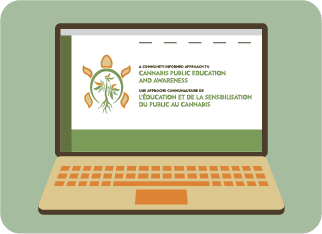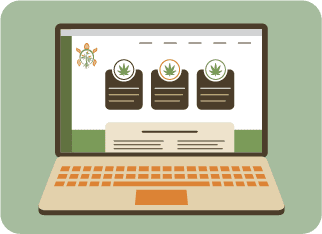Project Overview
Background
In 2018, the Government of Canada adopted a public health approach to the legalization and regulation of cannabis to protect the health and safety of Canadians. To reduce the risks and harms associated with cannabis use. Health Canada's Substance Use and Addictions Program (SUAP) funded community-based organizations across the country to provide cannabis public education and awareness.
NWAC was funded to work on a three-year project titled, "A Community-informed Approach
to Cannabis Public Education and Awareness for Indigenous Women, Girls and
Project Activities
Four main activities were used to fulfill the goals of the project.
Click on this symbol for more details.

Cannabis Education for and by First Nations, Inuit and Métis Peoples Website
This website is a central hub for proper and safe, indigenous-specific education on cannabis. Indigenous women and gender-diverse people can find unbiased information from a trusted source based on the best available evidence.
Cannabis Education for and by First Nations, Inuit, and Métis Peoples Website
The website sections, interactive tools and downloadable resources reflect the requests of our program participants and support their needs and visions for culturally safe cannabis education.
Participants in the project activities tolds us they wanted information on:
- the plant itself
- how cannabis interacts with our bodies
- the origin story of cannabis from an Indigenous perspective
- using cannabis while parenting and lactating, during pregnancy and while trying to conceive.

Literature Review and Resource Scan
Investigate existing research that was specifically done with Indigenous Peoples and resources, education, and public health initiatives relevant to Indigenous People. This information grounded the next steps of our project and served as a road map for gaps that need to be addressed and goals that needed to be achieved.
National Engagement Session
Our first engagement session was in Millbrook, Nova Scotia on March 5th, 2020. The engagement session brought togehter First Nations, Inuit, and Métis women and gender-diverse people from a wide range of professional and personal backgrounds regarding cannabis from across Canada. Participants touched upon a variety of topics throughout the day leaving us with a better sense of the district cannabis health education needs, barriers, and priorities of Indigenous peoples and their communities.
Virtual Community Engagement Sessions
Between Decemember 2020-March 2021, we held eight virtual community engagement sessions with 240 Indigenous women, Elders and gender-diverse people. Sessions were organized to be focused on 4 distinct groups: Métis, Inuit, on-reserve or remote / rural First Nations and off-reserve or urban First Nations. The purpose of these sessions was to get a better understanding of the distinct needs, concerns, and priorities of Indigenous women and gender-diverse people in each region at the community level.
National Online Survey
Based on knowledge gained from the initial project activities, key questions and concerns were identified and incorporated into the development of the National Online Survey launched May 2020. In total, 1,010 Indigenous women and gender-diverse people responded from across the country providing astute and critical perspectives surrounding their needs and priorities for cannabis public health education.Goals
 This discover was made by a U.S.-government funded study and initially identified
by Allyn Howlett and William Devane (Lee, 2010) and contributed to new understandings
of how cannabis helped with certain medical issues.
This discover was made by a U.S.-government funded study and initially identified
by Allyn Howlett and William Devane (Lee, 2010) and contributed to new understandings
of how cannabis helped with certain medical issues.
 This discover was made by a U.S.-government funded study and initially identified
by Allyn Howlett and William Devane (Lee, 2010) and contributed to new understandings
of how cannabis helped with certain medical issues.
This discover was made by a U.S.-government funded study and initially identified
by Allyn Howlett and William Devane (Lee, 2010) and contributed to new understandings
of how cannabis helped with certain medical issues.
 This discover was made by a U.S.-government funded study and initially identified
by Allyn Howlett and William Devane (Lee, 2010) and contributed to new understandings
of how cannabis helped with certain medical issues.
This discover was made by a U.S.-government funded study and initially identified
by Allyn Howlett and William Devane (Lee, 2010) and contributed to new understandings
of how cannabis helped with certain medical issues.